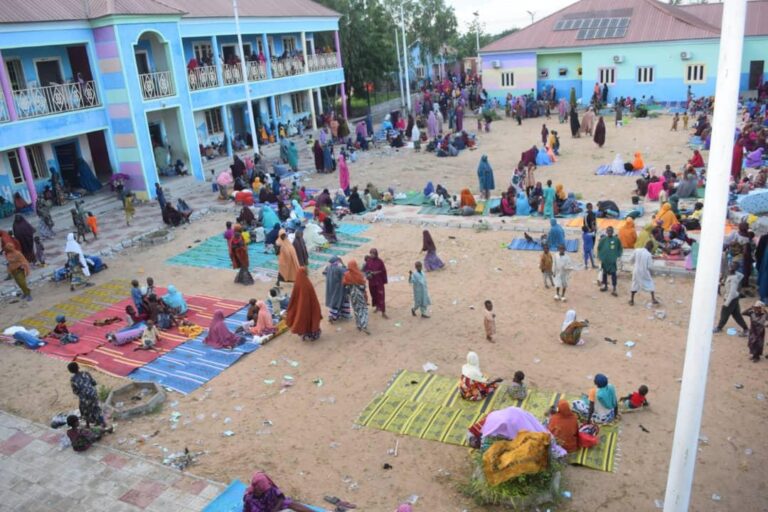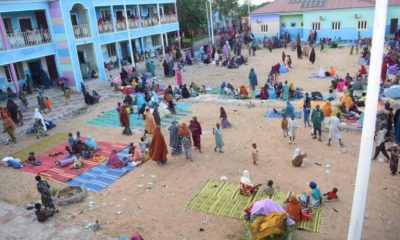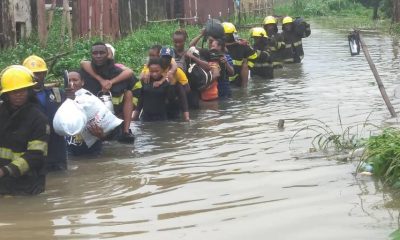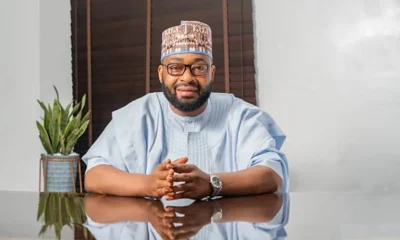NEWS
Customs Issues First PAAR Under B’Odogwu

The Nigeria Customs Service (NCS) has issued its first Pre-Arrival Assessment Report (PAAR) under B’Odogwu, its homegrown Unified Customs Management System.
NCS spokesperson, Abdullahi Maiwada, confirmed this in a statement on Friday in Abuja. He described it as a major milestone in the service’s commitment to technology-driven trade reforms.
PAAR is used to assess and verify the value, classification, and duty payable on imported goods before they arrive in Nigeria, ensuring compliance and transparency in trade processes.
The NCS developed B’Odogwu under its Trade Modernisation Project to automate operations and align with international standards.
The pilot phase launched in October 2024 at the Port and Terminal Multi-Services Limited (PTML) Customs Area Command in Lagos, with gradual implementation nationwide.
Maiwada said issuing the first PAAR marks the beginning of B’Odogwu’s national rollout, aimed at streamlining customs procedures and enhancing trade facilitation across Nigeria.
Daily Asset recalls that Customs’ Comptroller-General, Adewale Adeniyi, stated that the service, in collaboration with banks, was working to integrate PAAR and Form ‘M’ into the system.
Maiwada explained that once integrated, nearly 70 to 80 per cent of the service’s operations would be automated, significantly improving efficiency and transparency in customs processes.
He added that all necessary approvals and integrations with financial institutions, including Authorised Dealer Banks (ADBs), were being finalised for seamless foreign exchange transactions and payments.
According to him, this milestone follows a recent strategic meeting with the Governor, Central Bank of Nigeria (CBN), Yemi Cardoso.
During the meeting, both institutions reaffirmed their commitment to enhancing trade processes, improving revenue collection, and strengthening financial integration for better economic outcomes.
Maiwada stated that B’Odogwu replaces the Nigeria Integrated Customs Information System (NICIS II) and aims to modernise operations, enhancing efficiency and inter-agency collaboration.
He said stakeholders, including government agencies, were engaged during the pilot phase to ensure a smooth transition and effective implementation of the new system.
He urged stakeholders to adopt the software, supporting modernisation objectives and improving operational efficiency within the customs and trade sectors.
“The NCS, under the leadership of Adewale Adeniyi and his team, appreciates the support of all stakeholders.
“He encourages the trading community to embrace B’Odogwu for more efficient, transparent, and technology-driven customs processes,” Maiwada added. (NAN)
NEWS
Lagos ‘Shit Water’ Boreholes, Evidence of Government Failure – CAPPA

From Attah Ede, Makurdi
Corporate Accountability and Public Participation Africa (CAPPA) has noted with concern, the recent remarks made by Mahmood Adegbite, Permanent Secretary, Office of Drainage Services and Water Resources, Lagos State Ministry of the Environment and Water Resources, acknowledging that residents of the Lekki Peninsula are “probably drinking what I will call ‘shit water” due to contaminated boreholes.
In a statement on Sunday, CAPPA noted that while the bluntness of the statement has drawn attention, it is the underlying failure it exposes that should concern all Lagosians. “The government is bad-mouthing a crisis it manufactured. Boreholes and even dug wells in Lagos are not luxury choices for residents. They are a survival response and the last resort of a people forced to become their own service providers while public institutions fail to meet this basic need.“For decades residents of Lekki and indeed much of Lagos State have been left with no choice but to rely on unsafe, self-supplied water through boreholes, due to the government’s inability to provide reliable and affordable public water. That the Lagos State Government is now openly admitting the severe health risks this poses, without accepting responsibility is as dishonest as it is troubling,” the organisation observed.CAPPA argued that rather than mock residents for drilling boreholes, the government must first confront the root cause, which is the chronic neglect of Lagos’ public water infrastructure that has now left many Lagosians depending on all kinds of “shit water” for their daily existence.The statement pointed out that the problem of faecal contamination, poor wastewater management, and untreated sewage is not new, but “are symptoms of a water governance and sanitation system that has been deliberately left to rot, while decision-makers flirt with discredited privatisation models that place profit above people. What is missing is not a diagnosis of the problem, but a comprehensive, transparent, and publicly accountable plan to fix it.”CAPPA stressed that it has repeatedly raised the alarm about Lagos’ crippling underinvestment in public water infrastructure, the lack of transparency in water governance, and the persistent attempts to impose private sector-led water models — many of which have failed in other parts of the globe. It added that the government now appears to be reviving market-based water reforms without public consultation or accountability, warning that Lagos cannot continue down this road.“You cannot neglect your constitutional duty for decades, then turn around to shame people for doing what they must to survive,” said Akinbode Oluwafemi, Executive Director of CAPPA.“When the state cannot provide clean and safe water, people will do what they must to survive. The question we must ask is: What is the Lagos State Government doing to ensure that its citizens no longer have to drink contaminated water, or live in fear of the next outbreak of disease?”The Corporate Accountability and Public Participation Africa (CAPPA) in a statement by its Media and Communication Officer, Robert Egbe, called for urgent and dedicated public investment in water and sanitation, suspension of all market-based reforms, and adoption of a publicly led, community-focused water governance framework.He urged the Lagos state government to convene residents, civil society, and relevant experts in an open and transparent process to co-develop a people-centred water policy. It further demanded a state-wide emergency plan that targets underserved communities, repair broken wastewater systems, and integrate climate-resilient approaches to water access and drainage.The organisation noted that while regulation of indiscriminate borehole drilling is important, “it cannot happen without first providing viable and accessible public water alternatives.”“Lagosians are not to blame for drinking unsafe water. They are victims of policy failure. This failure must be acknowledged and corrected not weaponised to justify even more anti-people reforms,” it concluded.NEWS
Alia Rallies Stakeholders for Stronger Multi-Sectoral Coordination in Benue

From Attah Ede, Makurdi
Benue State Governor, Hyacinth Alia has reaffirmed his administration’s firm commitment to strengthening multi-sectoral coordination as a core strategy to improve service delivery, optimize resources, and ensure that all interventions meet the real needs of the people.
He stated this during a high-level meeting of the State’s Multi-Sector Coordination Platform, convened by the Bureau for International Cooperation and Development (BICD) at the BICD held at Government House, Makurdi. The meeting was with the theme “Strengthening the Benue State Multi-Sector Coordination Platform for Sustainable Impact.”The Governor, who was represented by his Chief of Staff, Chief Moses Atagher, declared the meeting open.He maintained that the current administration’s vision is to institutionalise government-led coordination as the standard for all partnerships in the state.The governor commended the BICD, under the leadership of Dr. Aondoaseer Leonard-Angelo Viashima, for its central role in aligning multi-sectoral interventions with the state’s priorities and fostering meaningful engagement between government and partners.He assured all stakeholders of his administration’s continued political leadership over the coordination process, its dedication to state ownership of partnerships, and its resolve to create an enabling environment for multi-sectoral action that delivers lasting benefits to communities across Benue State.Also speaking, the Secretary to the State Government, Deaconess Aber, emphasized the Governor’s directive for ministries, departments, agencies, and partners to work within the state-led coordination platform to achieve unity of purpose, avoid duplication, and ensure measurable results.The SSG who was represented by James Azande, Senior Special Assistant on Media in the Cabinet Office, appealed to the participants to take advantage of the meeting to strengthen partnership in the State.The day’s programme featured detailed updates from the BICD Technical Team on ongoing coordination efforts, partner registration compliance, and sector cluster designations, followed by a presentation from the Nigerian INGO Forum on gap mapping and opportunities for improved collaboration.A major highlight was the roundtable session, where MDAs and UN agencies presented their mid-year achievements, sharing updates on projects funded through grants, donations, and development programmes.These ranged from infrastructure upgrades, healthcare delivery, and educational initiatives to agriculture support, peacebuilding actions, and renewable energy deployment. Each presentation was followed by constructive reviews and feedback aimed at improving the impact, reach, and sustainability of interventions for the benefit of the people of Benue.The interactive Q&A session generated practical ideas for overcoming coordination challenges and reinforced the shared commitment to transparency, accountability, and delivering measurable results.The meeting concluded with clear next steps, including operationalizing sector working groups, launching enhanced coordination tools, and convening a joint review session in the fourth quarter of 2025.The meeting brought together a distinguished line-up of participants, including the Country Director of the Nigerian INGO Forum, Carmilla Higgins, and her delegation; heads of UN Agencies and offices active in Benue State; the Principal Private Secretary to the Governor, Dr. Emmanuel Chenge; the Director General of the Benue State Commission for Peace and Reconciliation, Mrs. Josephine Habba.Others are; the Director General of the Benue State SDGs Office, Chief John Akuse, the Director General of the Benue State Economic and Planning Commission, Prof. Jerome Andohol, the Director General of the Benue State Social Investment Project, Erdoo Iyo; Permanent Secretaries of the Ministries of Humanitarian Affairs and Disaster Management, Education, Health, Women Affairs and Social Welfare, Power and Renewable Energy, Works, Housing and Urban Development, Water Resources, Environment and Climate Change, and Agriculture and Food Security.NEWS
OAU Management Raises the Alarm as Student Goes Missing

From Ayinde Akintade, Osogbo
The authorities of Obafemi Awolowo University, Ile-Ife, have involved the Osun State Command of the Nigerian Police in its search for a female student of the institution who has been missing for four days.A release by the Public Relations Officer of the University, Abiodun Olarewaju, stated that the student, identified as Dorcas Oseghale, of the Department of Chemistry with Matric number: CHM/2021/165, was last seen on the evening of August 6, 2025 at about 8:00pm.
When Dorcas, who resides at Adesanmi House, Ibadan Road, Ile-Ife, said that she was going out to buy food in front of the students’ village, along Ede road axis of the University, did not return on time, her roommate then made several attempts to reach her on phone but surprisingly discovered that her two lines were not reachable.According to Olarewaju: “at around 3:00pm on August 7, 2025, a report of a missing female student was intercepted on a students’ social media platform and the Security Unit of the University started tracking the conversation around the incident. But around 6:10pm on the same day, a group of students from the Department of Chemistry, in search of the missing student, alongside a female student (Akinkuade Omobolanle Beatrice), from the Department of Agricultural Extension, identified as her roommate, reported a case of a missing student at the Security Unit of the University.Considering the complexity of the case and its limitations in terms of human and material resources, the Security Unit of the University then detailed three of its personnel to lead the students and report its preliminary findings to the Nigerian Police, which have enough manpower with sound professional and technical expertise to unravel the mystery surrounding the “disappearance” of the student, for further investigation.Meanwhile, the Vice Chancellor of the University, Professor Adebayo Simeon BAMIRE, has lauded the students of the University for being their brothers’ and sisters’ keeper, thanking them for quickly noticing that one of them is missing and promptly reporting the same to the appropriate quarters. The Vice Chancellor then appealed to the Police and other security agencies to do all within their power to help find the missing student.Bamire also appealed to anybody who may have useful information that can assist the security agencies on the whereabouts of Dorcas Oseghale to report to the nearest police station or the security unit of Obafemi Awolowo University, Ile-Ife.
















